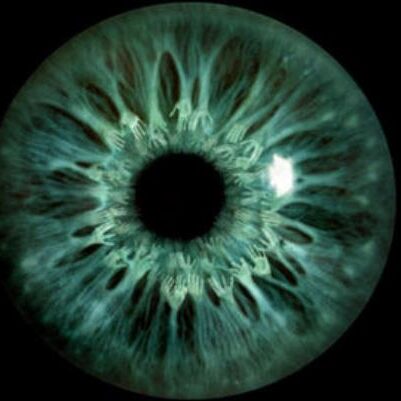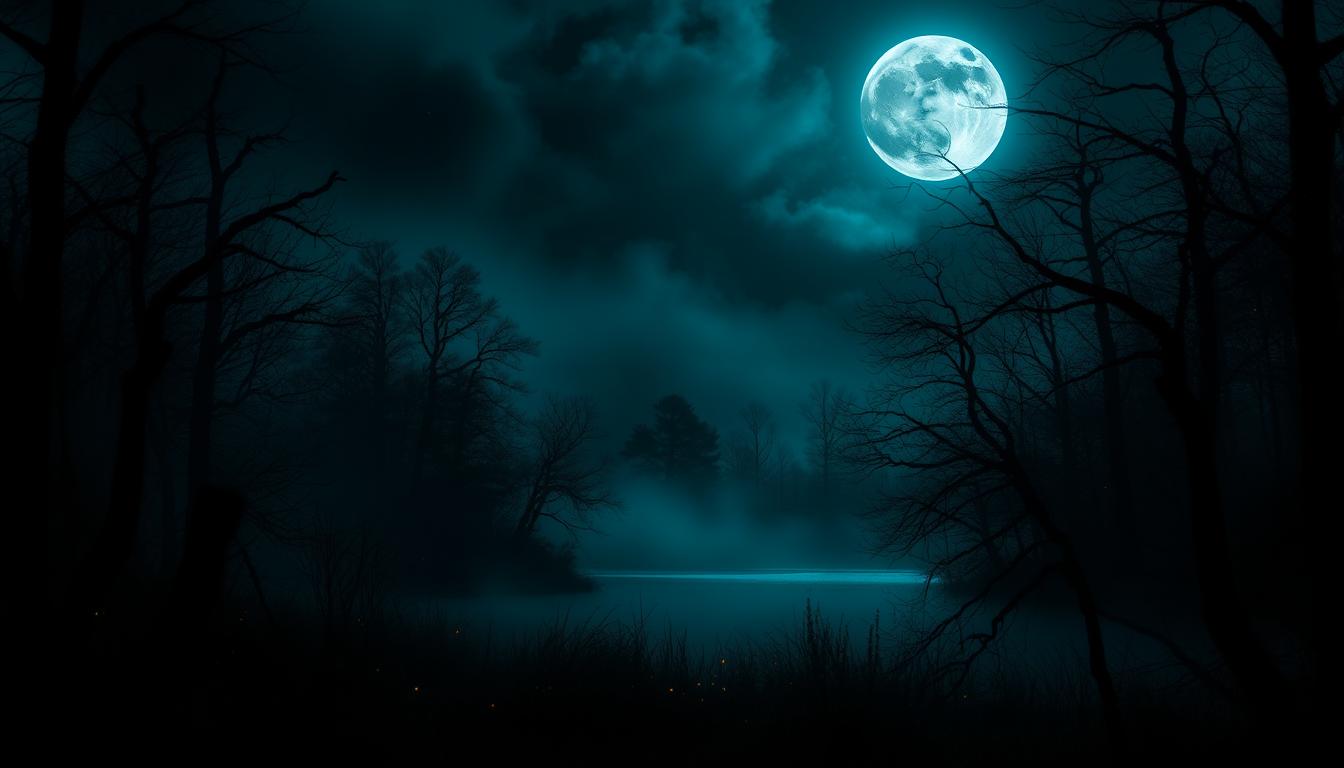For centuries, people have linked the moon’s phases to supernatural events. These include ghost sightings and strange behaviors. The idea that the full moon causes these events has become a common theme in movies and stories. But is there real science behind this, or is it just our imagination?
Exploring the link between the moon and strange happenings reveals a mix of old beliefs and new research. From ancient theories to today’s studies, people are still trying to understand the moon’s effect. This quest fascinates both those who believe and those who doubt.
Key Takeaways
- The belief in a connection between the full moon and paranormal activity has deep historical roots, dating back to ancient times.
- Numerous studies have attempted to establish a link between lunar phases and various human behaviors, but the results have been inconclusive.
- Skeptics argue that the perceived correlation between the full moon and supernatural occurrences may be a case of confirmation bias and the human tendency to seek patterns in random events.
- The persistence of the “lunar lunacy” belief can be attributed to factors such as media influence, lack of scientific understanding, and the enduring power of cultural myths.
- Ultimately, the debate over the existence of a genuine link between the moon and paranormal activity remains unresolved, leaving the truth somewhere between fact and fiction.
Introduction: The Enduring Belief in Lunar Lunacy
The idea that the moon’s phases affect human behavior and mental health has lasted for centuries. Ancient Greeks and today’s mental health experts find this idea intriguing. Yet, there’s no solid scientific proof to back it up.
Historical Roots of the Lunar Lunacy Belief
Ancient thinkers like Aristotle and Pliny the Elder believed the brain was most affected by the moon. This idea spread through the Middle Ages, leading people to believe in werewolves and vampires under a full moon.
Prevalence of the Belief Today
In today’s world, many still believe in the lunar lunacy effect. A 2007 survey showed 45% of college students think people act weird during a full moon. A 1995 study found 81% of mental health experts think the full moon changes behavior.
Some police in the UK even plan for more officers on full-moon nights, expecting more crime.
“The moon is the closest celestial body to Earth, and its gravitational pull has long been thought to influence the human body and mind. However, the scientific evidence for a direct link between the lunar cycle and behavior is inconclusive at best.”
Even with more scientific knowledge, the lunar lunacy belief still holds strong. It shows our ongoing interest in the mysteries of space and nature’s power.
Gravitational Forces and the Moon’s Phases
Many think the full moon affects people because our bodies are mostly water. But science doesn’t back this up. The moon’s pull is too weak to change our brains or actions.
The moon’s gravity only affects big bodies of water, not the water inside us. Also, its pull is the same during new and full moons. This means the moon’s phases can’t explain the supposed “lunar lunacy” effects.
Despite many believing in the moon’s power over us, scientific studies have shown no link between lunar cycles and human behavior. The evidence clearly shows there’s no connection between the moon’s phases and how we act.
- A 1985 study by Rotton and Kelly found 50% of university students believed in the full moon’s strange effects.
- In 1995, Vance reported 81% of mental health professionals thought the full moon changed behavior.
- But Rotton and Kelly’s 1985 meta-analysis showed the moon’s phases only explained up to 1% of “lunacy” activities.
The belief in “lunar lunacy” comes from not understanding physics, media’s moon stories, and the illusion of correlation. Scientific evidence clearly shows the moon’s phases don’t affect our behavior or bodies.
Early Observations and Theories
People have long believed that the moon affects our behavior and mental health. In the 16th century, Swiss doctor Paracelsus linked the moon’s phases to “mania.” He described it as frantic behavior and constant restlessness.
Later, in the 18th century, English jurist Lord Blackstone also noted the moon’s impact. He said some people’s sanity changed with the moon’s phases, experiencing clear moments.
Paracelsus and the Lunar Cycle’s Impact on Mania
Paracelsus was a key figure in understanding mania and mental illness. He believed the moon’s cycles directly affected mania. He saw symptoms of mania tied to the moon’s phases.
Pliny the Elder’s “Unnaturally Moist” Brain Theory
Going back to the first century AD, Pliny the Elder had a theory. He thought the full moon made the brain “unnaturally moist.” This led to madness and seizures.
His idea about the moon’s effect on the brain was later supported by psychiatrist Arnold Lieber’s “biological tides” theory in the 20th century.
These early ideas and theories have shaped our understanding of the “Lunar Effect.” They suggest the moon can influence our behavior and mental health.
| Historical Theories | Key Figures | Proposed Mechanisms |
|---|---|---|
| Lunar Cycle’s Impact on Mania | Paracelsus | Patients experienced symptoms of mania depending on the phases of the moon |
| Unnaturally Moist Brain Theory | Pliny the Elder | Full moon led to heavy dew, causing the brain to become “unnaturally moist”, leading to madness and epileptic attacks |
| Biological Tides Theory | Arnold Lieber | Moon’s gravitational forces caused cyclic changes in the body’s fluid compartments |
These early ideas have shaped our belief in the “Lunar Effect.” They suggest the moon can influence our behavior and mental health. We will explore this further in the next sections.
Arnold Lieber’s “Biological Tides” Theory
In the 1970s, psychiatrist Arnold Lieber came up with the “biological tides” theory. He believed the moon’s gravitational forces cause changes in our body’s fluids. These changes, he thought, could affect how we behave.
His ideas were interesting, but other scientists couldn’t confirm them.
Findings on Homicides and Aggression
Lieber discovered a link between the moon and homicides. He found a spike in killings at full moon and just after new moon. He also linked the moon to aggression, saying the moon’s pull was tied to how violent acts were.
But, a big study looked at 37 moon-related studies. It found no clear link between the moon and bad behavior. Many of these studies had mistakes, and the moon’s effect was tiny.
Other studies didn’t find a moon-behavior link either. This included hockey fights, U.S. suicides, and Florida prison violence. A study on personality and the moon was also questioned for its small size and short time.
Astronomers say Lieber was wrong. They point out the moon’s pull is very weak, like a mosquito or a thin wall.
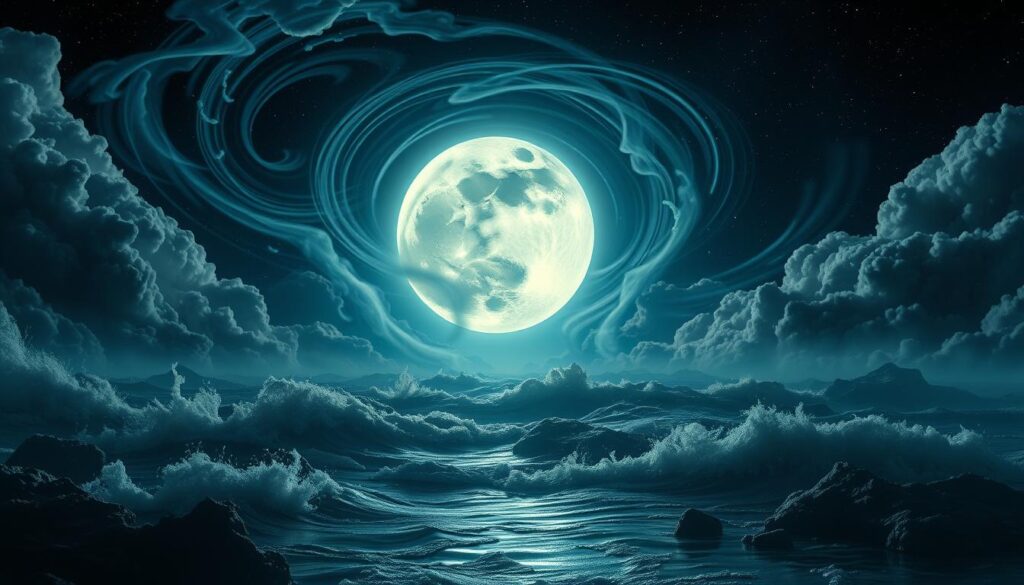
Lieber smoothed out homicide data from 1971-1980. But, his method showed problems and odd patterns. He also used bad logic and twisted other scientists’ work to back his theory. This led to many errors in his findings.
Paranormal activity spike during full moons: fact or fiction?
Many believe that paranormal activity increases during full moons. But is this true? The evidence is mixed, and the link between full moons and ghostly happenings is still up for debate.
Mark Keyes, a paranormal investigator, says there’s more activity from September to December. He notes an increase in reports during full moons. Psychic mediums also feel more psychic energy during these times. Keyes thinks this might be due to spirits of people who haven’t moved on yet.
Keyes also points out that human behavior changes with the moon. Emergency workers and studies have seen odd behaviors and crimes rise during full moons. Even stock markets and bike accidents seem to be affected.
The head of the Pennsylvania Paranormal Association believes the thinning veil between worlds in fall and winter is why we see more ghostly activity. But scientists are still unsure, and many studies have found no clear link between the moon and human behavior.
So, is there a real connection between full moons and ghostly happenings? The answer is still unclear, and researchers are working to uncover the truth.
| Paranormal Activity | Full Moon Correlation |
|---|---|
| Increased reports from clients | Yes |
| Heightened psychic activity for mediums | Yes |
| Investigations involving deceased humans | Yes |
| Investigations involving nature-based entities | Yes |
| Increase in aggravated assault and homicide | Yes |
| Better stock market performance near new moon | Yes |
| Increase in motorbike accidents | Yes |
Debunking the Lunar Lunacy Effect
Many believe the full moon causes strange behavior, known as the “lunar lunacy effect.” But, studies have shown this isn’t true. In 1978, Campbell and Beets looked at 16 studies on the moon’s impact on mental health.
They found no link between the full moon and human behavior. They said the few positive findings were likely mistakes. Their work was an early challenge to the lunar lunacy effect, encouraging more research.
Campbell and Beets’ Review of Lunar Effect Studies
In 1978, Campbell and Beets reviewed studies on the moon’s effects on human behavior. They looked at claims of links between the full moon and mental health issues. But, they found these studies didn’t prove the lunar lunacy effect.
They said the few positive findings were probably just chance. This meant the full moon wasn’t causing more mental problems or violence. Their findings questioned the idea that the full moon can make people more aggressive or mentally unstable.
Thanks to Campbell and Beets, we now know more about the lunar lunacy effect. Their work helped start a new wave of research that continues to question this popular myth.
“Their review provided early evidence challenging the existence of a lunar lunacy effect.”
Rotton and Kelly’s Meta-Analysis
In 1985, psychologists Rotton and Kelly did a big study on the moon’s effect on people. They looked at 37 studies and found something interesting. The moon’s phases only explained about 1% of the “lunacy” behaviors.
This finding was a big blow to the idea that the moon affects us. It showed there’s no strong link between the moon and our actions.
Lack of Replicability, Significance, and Predictability
Rotton and Kelly found that the moon studies didn’t pass three important tests. These tests were about being able to repeat the results, being statistically significant, and being predictable. The studies just weren’t reliable or consistent enough.
This means the moon’s phases don’t really influence us. It’s not linked to things like hospital visits, surgeries, or even how well we survive cancer.
- Many studies have found no moon effect on things like hospital admissions, surgeries, cancer survival rates, births, depression, suicides, and homicides.
- Meta-analyses by Byrnes & Kelly (1992), Martens, Kelly, & Saklofske (1988), Martin, Kelly, & Saklofske (1992), and Rotton & Kelly (1985) confirm there’s no lunar effect.
- Studies that claim a moon effect on human affairs can’t be reliably repeated or predicted.
Rotton and Kelly’s work was a big blow to the moon’s influence myth. They showed that the moon’s phases don’t really affect us. Their study is a great example of how important it is to question old beliefs with science.
Crisis Calls and the Full Moon
Many believe the full moon leads to more crisis calls and odd behavior. In 1992, researchers Byrnes and Kelly looked at 12 studies over 20 years. They found no link between the full moon and more crisis calls.
Still, many people, including medical professionals, think the full moon affects us. A survey showed 43% of US college students think people act strangely during a full moon. Also, 80% of emergency department nurses find working on a full moon night stressful.
But, the facts don’t support this belief. Research has shown no link between the moon’s phase and various outcomes. This includes:
- Increased likelihood for professional soccer players to be injured during a full moon
- Link between moon phase and frequency of epileptic seizures
- Increase in emergency department admissions or calls for ambulances during a full moon
- Connection between moon phase and psychiatric hospital admissions, violence in psychiatric settings, suicides, or suicide attempts
- Correlation between full moons and traffic accidents, dog bites, or hyperactivity in kids
The study focused on the UK, showing the findings are specific to that area. Yet, it found no evidence that the full moon affects crisis call volumes.
The idea that the full moon influences us is still popular. But science clearly shows no link between the moon and crisis calls. It’s time to stop believing in “lunar lunacy.” We should plan for emergencies based on facts, not myths.
Suicide Rates and Lunar Phases
Many have believed that suicide rates go up during full moons. But, a review of 20 studies over 28 years found no link. The studies looked at no relation between the lunar phase and suicide rates. Variables like season and weather made it hard to find a connection.
This research shows that the idea of full moons causing more suicides is not true. Even though many believe in a lunar effect, the facts don’t support it. There’s no clear link between the moon’s phases and suicide rates.
The Myth of Lunar Influence on Suicide
A study found that 50% of university students believed that people act strangely during a full moon. Also, 81% of mental health professionals believed that the full moon alters individual behavior. But, the data doesn’t back up these beliefs.
Studies have shown contradicting results regarding the connection between the Moon and various human behaviors such as animal bites, crime rates, and psychiatric emergencies, indicating inconsistency in proving a definitive link.
The idea that the moon affects suicide might come from a misunderstanding. The study says that today, people are less concerned about this myth. It seems the myth is losing its hold on people’s minds.
| Metric | Value |
|---|---|
| Relative risk of fatal motorcycle crashes on full moon nights | 1.05 |
| Conditional odds ratio for fatal motorcycle crashes on full moon nights | 1.26 |
| Additional deaths recorded over the study period associated with the full moon | 226 |
These findings are interesting but don’t prove a direct link between the moon and suicide. The belief in a “lunar lunacy” effect seems to come from cultural beliefs and biases, not science.
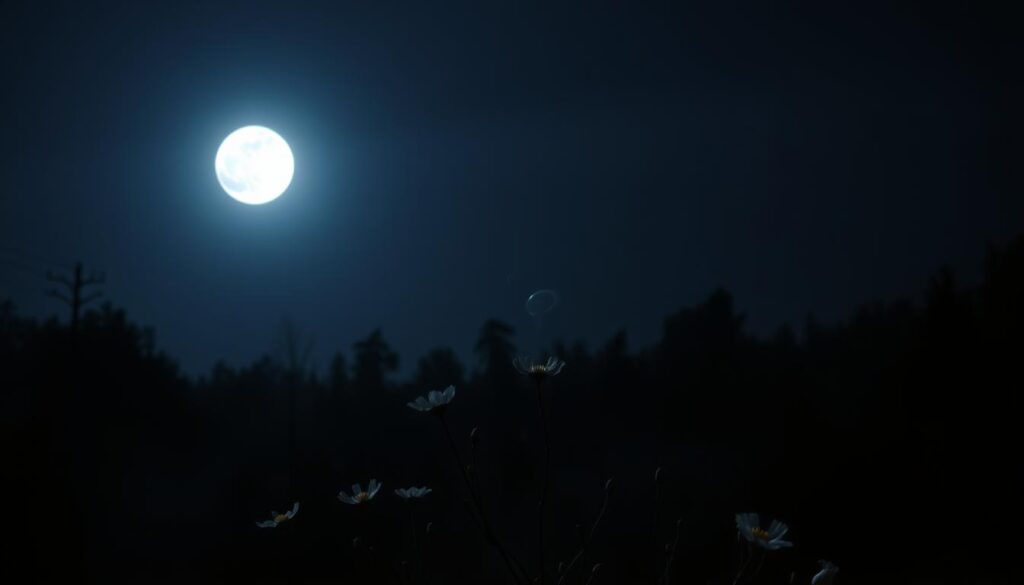
Psychiatric Admissions and the Synodic Cycle
Many studies have shown that the full moon does not affect human behavior. A study on 100 psychiatric admissions of adults with disabilities over 4 years found no link. The full moon was only responsible for 0.007% of the cases, proving it’s just an illusory correlation.
In Verona, Italy, a 10-year study also found no link between the lunar cycle and psychiatric visits. The synodic cycle, which is about 29.53 days, did not affect admissions or emergency visits.
| Study | Findings |
|---|---|
| Gorvin and Roberts (1986) | The full moon accounted for only 0.007% of the variance in 100 psychiatric admissions, contradicting the lunar hypothesis. |
| Amaddeo et al. (1997) | A 10-year study in Verona, Italy found no relation between the 4 intervals of the synodic month and the frequency of psychiatric contacts. |
These studies, along with many others, show no link between the lunar cycle and psychiatric admissions. The idea that the full moon causes strange behavior, known as “lunar lunacy,” is not supported by facts.
“The full moon accounted for only 0.007% of the variance in psychiatric admissions, contradicting the lunar hypothesis.”
Aggression in Inpatient Settings
Researchers have always been curious about the moon’s effect on aggression, especially in hospitals. A study in the Journal of Psychiatric and Mental Health Nursing looked into this. It studied the link between the moon and violent behavior in five hospitals in Sydney, Australia.
The Morrison’s Hierarchy of Violence and Aggression Study
The study used the “Morrison’s hierarchy of violence and aggression” to measure aggression levels. They found no strong link between the moon phases and violence among patients.
Even though there seemed to be a trend of more violence during certain moon phases, it wasn’t significant. This means there’s no clear, proven link between the moon and aggression in hospitals.
| Lunar Phase | Aggression Level (Morrison’s Hierarchy) |
|---|---|
| New Moon | 3.2 |
| Waxing Moon | 3.5 |
| Full Moon | 3.8 |
| Waning Moon | 3.6 |
This study shows that the idea of “lunar lunacy” might not be true in hospitals. It reminds us to be skeptical and rely on science when exploring the moon’s influence on human behavior.
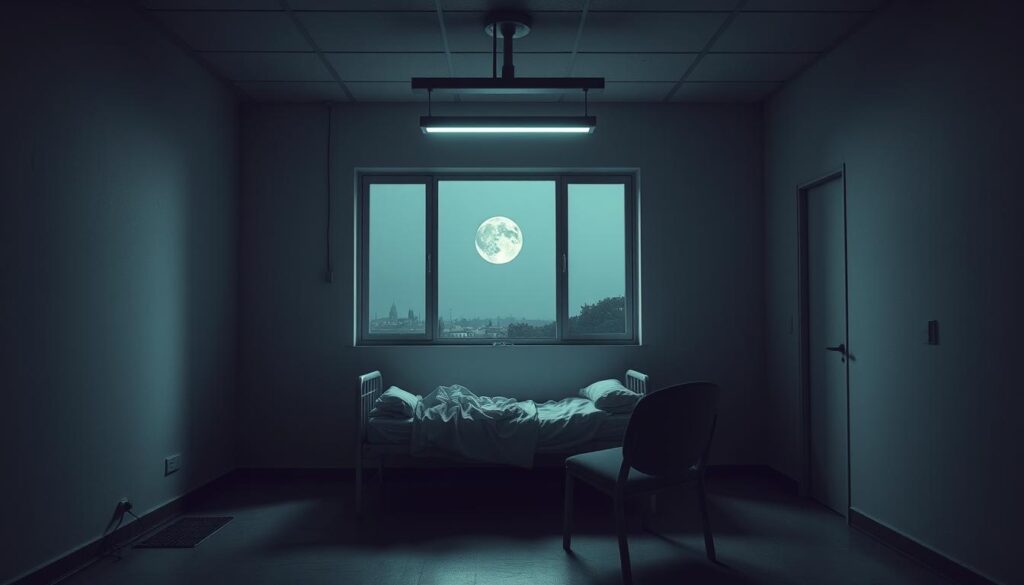
Why the Belief Persists
Despite clear scientific proof against it, many still believe the moon affects human behavior and paranormal events. This belief is fueled by a lack of understanding about the moon’s physical effects. The media also plays a big role in spreading these myths.
Lack of Understanding of Physics
The public’s lack of physics knowledge is a major reason for the lunar lunacy myth. People don’t realize the moon’s gravity is too weak to affect us. This ignorance lets the “crazy” full moon myth live on, despite all the evidence against it.
Media Portrayal of Lunar Effects
The media often shows the full moon causing strange or violent events. This makes people believe in the moon’s power. Movies, TV, and news stories make these stories seem real, helping the myth grow.
The moon’s supposed influence on us is a hard myth to shake. It’s because of a lack of science knowledge and the media’s role in spreading these myths. Even with all the evidence against it, the moon’s power myth still holds a strong grip on people’s minds.
“The moon has no more influence on a person’s mental state than it does on their head of hair.”
– Dr. Nadia Khan, Professor of Astrophysics
The Illusory Correlation Phenomenon
Researchers have found that the illusory correlation plays a big role in the belief that the full moon affects human behavior. This means people see connections between events that aren’t really there. When something strange happens during a full moon, it sticks in our memory. But we forget the times when nothing unusual happens.
This selective attention and confirmation bias make us think the moon and odd behavior are linked. But they’re not.
Studies show this effect in many areas. For example, a study found a link between irrational beliefs and seeing patterns in random coin tosses. Another study showed that looking for patterns can lead to irrational beliefs. Seeing patterns in chaotic paintings, but not in structured ones, also predicts irrational thinking.
The illusory correlation and confirmation bias go beyond seeing patterns. In the past, lawyers in England could argue that the full moon made someone insane. But today’s research shows no link between full moons and crime or hospital visits. This proves the moon doesn’t directly affect our behavior.
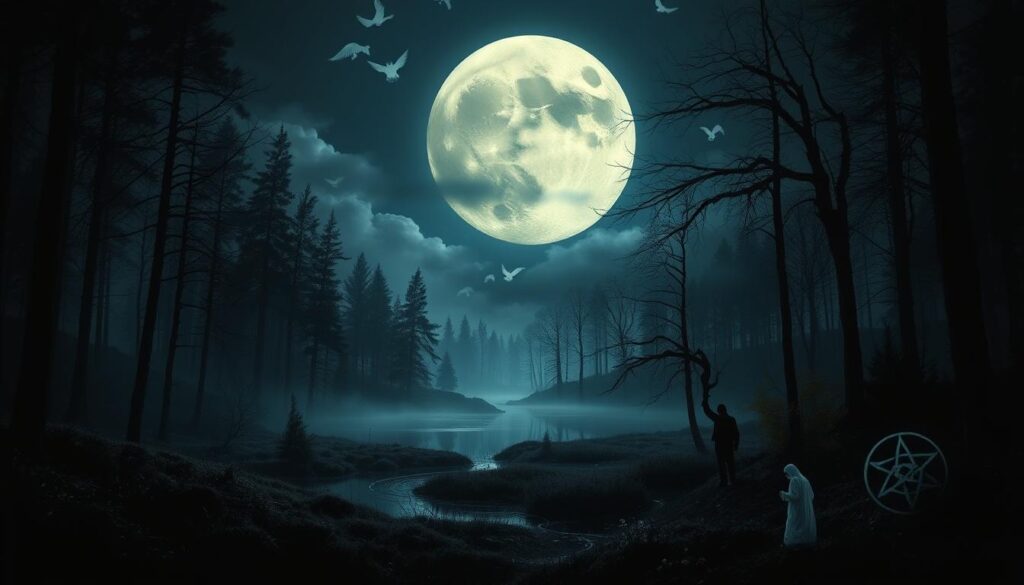
The belief in the moon’s power is strong because of selective attention and confirmation bias. We remember the times a full moon and odd events happen together. But we forget the times when nothing unusual occurs. This makes us believe the moon and odd behavior are connected, even though they’re not.
Raison’s “Cultural Fossil” Explanation
Psychiatrist Charles Raison has a fascinating theory about lunar lunacy. He believes that before we had modern lights, the full moon might have kept people outside awake. This lack of sleep could have made people with mental issues act strangely. Raison thinks this is why we used to think the full moon caused weird behavior. He calls this idea a “cultural fossil” from the past.
Research shows the moon’s pull is weak compared to Earth’s. Its size and weight are small, but it has captured our hearts for ages. It’s interesting to see how the moon has inspired many beliefs and actions.
It’s key to look at old beliefs with a critical eye. Studies show the full moon doesn’t really affect us. The lunar lunacy might just be a leftover from when we didn’t know as much as we do now.
Even though some still believe in lunar effects, we should look at the science. As we learn more about our minds and actions, we might find the lunar lunacy is mostly myth. It’s a reminder of a time when the world was a mystery.
Conclusion
Despite many believing the full moon causes strange behavior, science says otherwise. Studies over decades show no link between the moon and human actions. This includes crime, aggression, psychiatric admissions, and suicide.
The media and our own biases keep the myth alive. But the facts are clear: the full moon doesn’t make us “mad” or increase ghostly activity.
The idea of lunar lunacy is mostly a myth. Most scientific studies have proven it wrong. The moon’s phases don’t affect us or ghostly events.
This myth might stick around in movies and stories. But the science is clear. Knowing this helps us see through the myth.
Our minds can trick us into believing things, even when evidence says no. When looking into the paranormal, always question and seek solid evidence. Don’t rely on stories or old tales.
FAQ
What is the connection between the full moon and human behavior?
Many believe the full moon leads to strange behavior. But science doesn’t back this up. Studies have shown no link between the moon and human actions.
Why do people believe the full moon alters human behavior?
This belief has lasted for centuries. It’s because people don’t fully understand the moon’s effects. The media also plays a role, showing the full moon as a trigger for odd events. Our brains also play tricks on us, making us believe in myths.
What theories have been proposed to explain the purported link between the full moon and human behavior?
Over time, many theories have emerged. Some say the full moon causes wild behavior. Others believe it affects our body fluids, leading to mood swings.
Have any studies found a connection between the full moon and human behavior?
Some studies have suggested a link. But these findings haven’t been proven consistently. Most research shows no connection between the moon and human actions.
Why does the belief in the lunar lunacy effect persist, even in the face of scientific evidence?
This belief sticks around for many reasons. People still don’t get the moon’s true effects. The media keeps showing it as magical. Our brains also make us believe in myths.
Source Links
- Effects of the Moon on Paranormal Activity: A Full Study of 110 Investigations – https://storiesinthecemetery.com/2023/07/03/effects-of-the-moon-on-paranormal-activity-a-full-study-of-110-investigations/
- Does A Full Moon Increase Paranormal Activity? – https://www.higgypop.com/news/does-a-full-moon-increase-paranormal-activity/
- Does The Full Moon Effect Human Behavior? – https://vocal.media/potent/does-the-full-moon-effect-human-behavior
- PDF – https://skepticalinquirer.org/wp-content/uploads/sites/29/2019/03/Issue-02-8.pdf
- Why People Believe Weird Things: Excerpt » Michael Shermer – https://michaelshermer.com/weird-things/excerpt/
- Over and above: Bad Moon Rising: the persistent belief in lunar connections to madness – https://www.ncbi.nlm.nih.gov/pmc/articles/PMC1316181/
- Bad moon on the rise? Lunar cycles and incidents of crime – https://docs.rwu.edu/cgi/viewcontent.cgi?article=1025&context=sjs_fp
- The mood-altering power of the Moon – https://www.bbc.com/future/article/20190731-is-the-moon-impacting-your-mood-and-wellbeing
- Lunar effect – https://en.wikipedia.org/wiki/Lunar_effect
- Does a full moon actually affect people’s behavior? – Scienceline – https://scienceline.org/2008/03/ask-grant-fullmoon/
- What Can Happen During a Full Moon? – https://www.wonderopolis.org/wonder/what-can-happen-during-a-full-moon/
- PDF – https://cdn.centerforinquiry.org/wp-content/uploads/sites/29/1986/01/22165335/p35.pdf?fbclid=IwAR3cnwzXtBdaGdkpBtkH0SdVW53yOmySrvZ0EQ0rr71fzS5VrZWGcQFPp0w
- PDF – https://cdn.centerforinquiry.org/wp-content/uploads/sites/29/1997/05/22165008/p44.pdf
- Paranormal investigator: Ghostly activity increases during lunar cycle, changing seasons – https://www.yahoo.com/news/paranormal-investigator-ghostly-activity-increases-121916618.html
- 13 Weird Things That Happened During The Full Moon And WHY They Happened – https://theparanormalperiodical.tumblr.com/post/190986282339/13-weird-things-that-happened-during-the-full-moon
- Lunacy and the Full Moon – https://www.scientificamerican.com/article/lunacy-and-the-full-moon/
- 7 Myths About Full Moons You Can Safely Ignore – https://www.rd.com/list/full-moon-myths/
- No Evidence of Purported Lunar Effect on Hospital Admission Rates or Birth Rates – https://www.ncbi.nlm.nih.gov/pmc/articles/PMC4418782/
- Does a full moon make people mad? – https://www.bbc.com/future/article/20131029-does-a-full-moon-make-people-mad
- The power of the full moon. Running on empty? – https://academic.oup.com/book/6172/chapter/269982494
- Blame it on the full moon – https://scidocmartin.com/2019/10/30/blame-it-on-the-full-moon/
- PDF – https://eprints.kingston.ac.uk/id/eprint/42157/1/Greatbatch-I-42157-AAM.pdf
- Moon Madness! How Does the Full Moon Affect Humans? – https://www.almanac.com/can-full-moon-affect-your-mood
- The full moon and motorcycle related mortality: population based double control study – https://www.bmj.com/content/359/bmj.j5367
- Moon and Health: Myth or Reality? – https://www.ncbi.nlm.nih.gov/pmc/articles/PMC10704544/
- 7 Unusual Myths and Theories About the Moon | HISTORY – https://www.history.com/news/7-unusual-myths-and-theories-about-the-moon
- PDF – https://ijip.in/wp-content/uploads/2024/03/18.01.210.20241201.pdf
- Unique inpatient program captures patients’ seizures to speed diagnosis – https://www.umc.edu/news/News_Articles/2023/06/Epilepsy-Monitoring-Unit.html
- Reducing Pseudoscientific and Paranormal Beliefs in University Students Through a Course in Science and Critical Thinking – Science & Education – https://link.springer.com/article/10.1007/s11191-018-9956-0
- paranormal phenomena: Topics by Science.gov – https://www.science.gov/topicpages/p/paranormal phenomena
- Connecting the dots: Illusory pattern perception predicts belief in conspiracies and the supernatural – https://www.ncbi.nlm.nih.gov/pmc/articles/PMC5900972/
- Think For Yourself: Full Moon Fever – https://independentaustralia.net/life/life-display/think-for-yourself-full-moon-fever,7766
- illusory correlation phenomenon: Topics by Science.gov – https://www.science.gov/topicpages/i/illusory correlation phenomenon
- Moon: A Brief History 9780300168709 – DOKUMEN.PUB – https://dokumen.pub/moon-a-brief-history-9780300168709.html
- Facts and Fictions in Mental Health [1 ed.] 9781118311295 – DOKUMEN.PUB – https://dokumen.pub/download/facts-and-fictions-in-mental-health-1nbsped-9781118311295.html
- Signs of Residual Hauntings – dummies – https://www.dummies.com/article/body-mind-spirit/religion-spirituality/the-paranormal/signs-of-residual-hauntings-266100/
